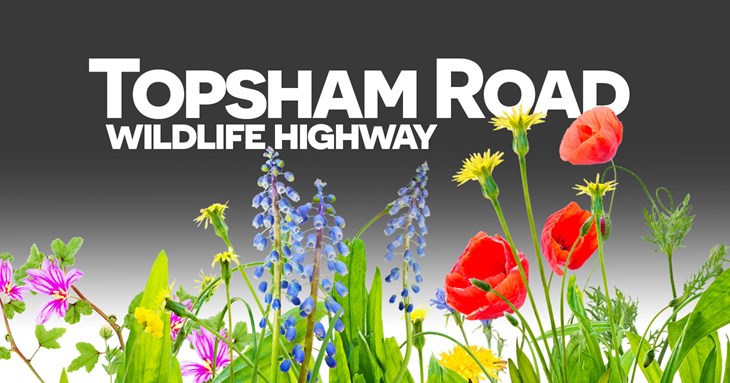Exeter’s Topsham Road to become city’s first ‘wild highway’
Published: 12 April 2022

One of Exeter’s busiest roads is set to become what a leading local conservation organisation is calling a ‘wild highway’.
Topsham Road is one of Exeter’s busiest arterial routes, carrying thousands of vehicles in and out of the city each day, along with all the noise and pollution these create.
But now the road, with others in the city, is set to become a little more wildlife-friendly and more colourful thanks to a joint initiative between the charity Devon Wildlife Trust and Exeter City Council.
This spring areas of Topsham Road have been dug and then sown with wildflower seed mixes. In weeks the areas of bare soil will become vibrant bursts of colour provided by a mix of wildflowers.
Elsewhere the management of grass verges will be altered, leaving them to grow longer. The impact of both moves will be to boost habitat for local wildlife, especially pollinating insects including bees, moths and butterflies. The measures to help wildlife are only being done in places where it is safe to do so - away from pedestrian crossings and busy road junctions.
The initiative is part of the Exeter Wild City project, which for the past decade has seen Devon Wildlife Trust and Exeter City Council working with local communities in the city.
This partnership has produced a network of other wildflower areas, such as the colourful ones seen each summer along Prince Charles Drive and at Moor Lane roundabout. Mini-meadows have also been planted in many of the city’s parks and school grounds, along with several community orchards.
Devon Wildlife Trust’s Emily Spraggon is working with Exeter City Council to deliver the new wildflower planting. Emily says: “The hope is that by the summer people travelling along Topsham Road will be able to follow a wildlife highway created from wildflowers and more nature-friendly managed grass verges.
“The meadow flowers and grasses will attract insects such as bees, beetles, grasshoppers, butterflies and moths. These in turn will provide food for birds, bats and other animals. If we can better connect the big green spaces in our city such as Valley Parks by creating more nature-friendly corridors then we should all be able to see more wildlife near where we live and work.”
As part of this pilot scheme residents and businesses along Topsham Road and South Street will be invited to participate in creating three miles of new wildlife corridors on the edges of their streets.
This could be by planting pollinator friendly window boxes, sowing a mini-meadow, planting a fruit tree, putting in a small pond, allowing hedgehog access into gardens. These and other ideas can be found on the Devon Wildlife Trust website.
The charity is giving away a limited number of seed sachets to participants who live along Topsham Road and South Street. People wanting these can apply at the ‘Exeter Wild City’ page of Devon Wildlife Trust’s website www.devonwildlifetrust.org
